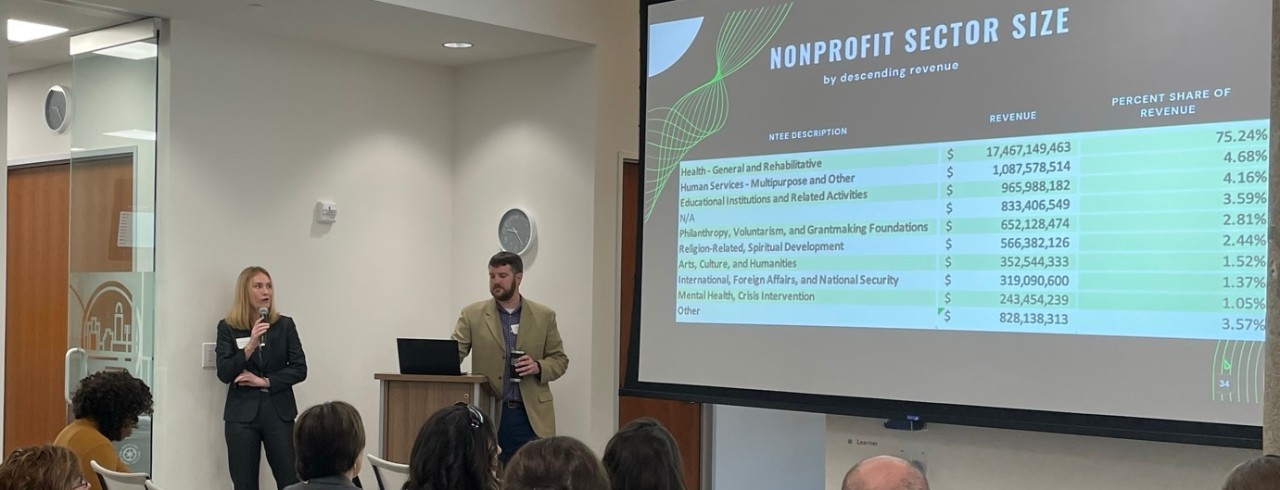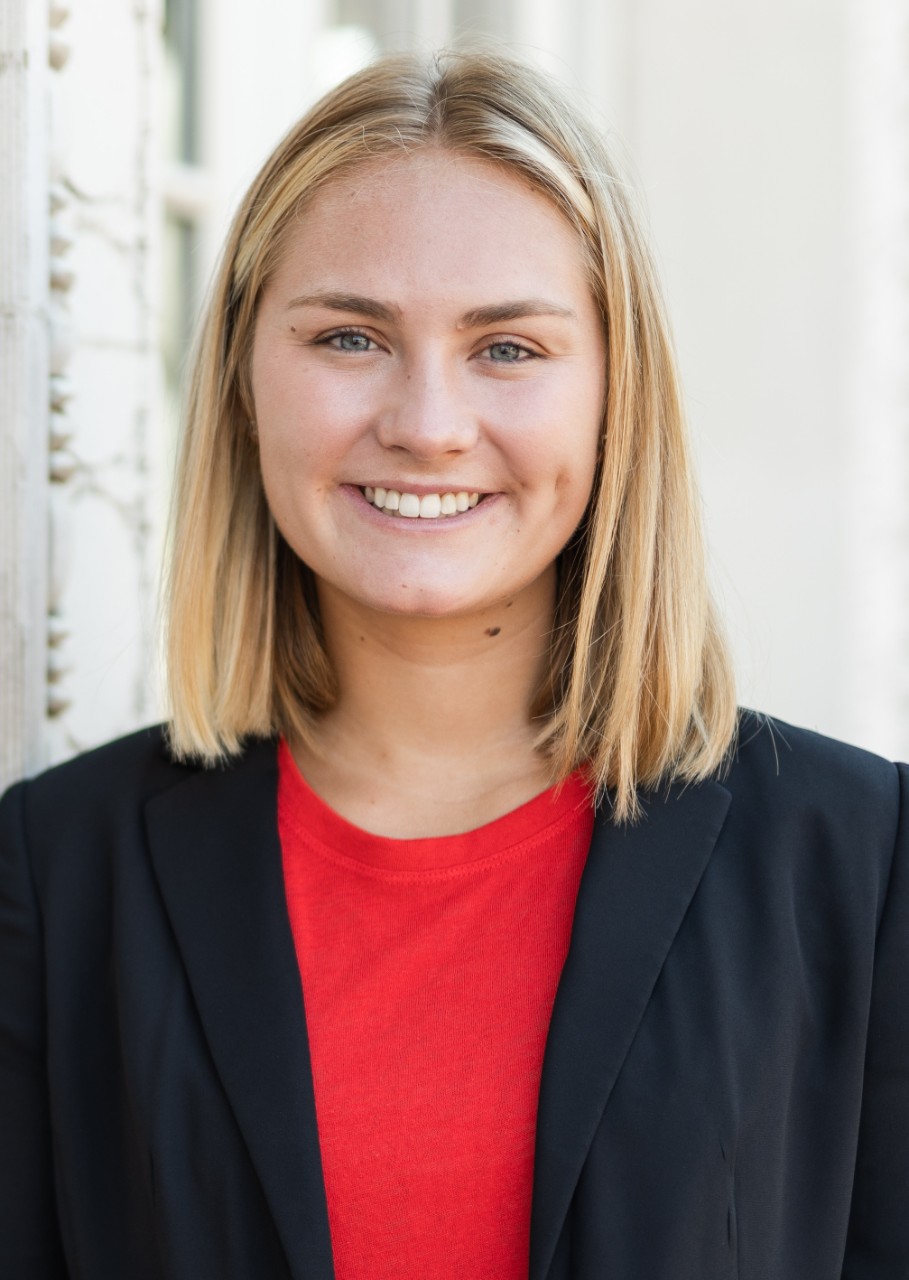
UC student reveals insight into pandemic’s effects on nonprofits
Annie Hugenberg presents findings at inaugural workshop series
Analysis conducted by a University of Cincinnati economics and marketing student has provided a better understanding of the COVID-19 pandemic’s effects on the nonprofit industry.

Annie Hugenberg
Annie Hugenberg, Carl H. Lindner College of Business senior and Kautz-Uible Amanda Wait Research Fellow, spent the past semester conducting an in-depth analysis of the economic landscape of Cincinnati’s nonprofit sector, culminating with her presentation at the first-ever installment of Better Together — a workshop series for the local nonprofit community made possible by OneSource Center for Nonprofit Excellence, the Leadership Council for Nonprofits, the Cincinnati chapter of the Association for Fundraising Professionals, Interact for Health, and Pro Bono Partnership of Ohio.
The nonprofit space is something that is near and dear to Hugenberg’s heart.
“From a young age, I’ve always been drawn to serving others,” she said. “During my time at Lindner, I’ve sought out opportunities to explore this passion by partnering with nonprofits both in and out of the classroom, through my co-ops, academics and student involvements.”
Hugenberg’s first co-op rotation was with a local organization called the Leadership Council for Nonprofits, whose mission is to “maximize the impact of nonprofit organizations, develop their leaders, and strengthen the community.” Working closely with the Leadership Council’s Board Orientation and Leadership Development program, she got an up-close view of the inner workings of nonprofits and how they operate in relation to boards.
On campus, Hugenberg joined Students Consulting for Nonprofit Organizations her first year at UC and eventually became president; in this role, she connected the needs of local nonprofits with UC students’ desire to serve and grow as young professionals.
Under the guidance of the Kautz-Uible Economics Institute’s Academic Director Michael Jones, PhD, Hugenberg has put all that she's learned to practice through an independent study of the pandemic's effect on the nonprofit industry as she examined the economic landscape of local nonprofits pre- and post-COVID-19. With the help of artificial intelligence (AI) chatbot ChatGPT, she wrote code to analyze the economic trends in 2019 and 2021 across different focus areas within the nonprofit space, such as the arts, cultures and humanities, and education.
Nonprofits can have the power and the drive to change the world, but oftentimes, smaller-scale organizations do not have the same resources that for-profit businesses have.
Annie Hugenberg Kautz-Uible Amanda Wait Research Fellow
During the Better Together session, Hugenberg spoke directly to local nonprofits, providing them with an exploration of the economic outlook of the sector — including a national overview, a local breakdown and a summary of economic trends — in an effort to inform their business decisions in the future.
Among these trends was a significant cash increase for local nonprofits during the pandemic due to COVID-19-related stimulations, which allowed organizations to increase cash on hand to around six months compared to four months in 2019.
Hugenberg also found that fundraising expenses decreased by nearly 45%, but fundraising income only decreased by 9%, demonstrating that while nonprofits were spending less on fundraising, they were still able to maintain significant donations.
“Annie demonstrated careful and insightful work on advancing our understanding of the region’s nonprofit sector,” Jones said. “She discovered that nearly 500 501c3s are started every year — illustrating the dynamic nature of this part of the economy — but also suggesting that more collaboration and partnership is needed among various organizations.”
Part of that dynamic nature will undoubtedly be affected by AI technology, an emerging disruptor of the labor market.
Annie's deep dive into the economic outlook of the nonprofit sector and the impact of AI technology was incredibly informative and provides valuable context for future planning.
Christie Brown CEO of OneSource Center for Nonprofit Excellence
In her presentation, Hugenberg explained how AI will inevitably impact employees' responsibilities in the workplace as it replaces some of the tasks they previously completed and encouraged nonprofits to consider how they might adapt to this change.
“Annie's deep dive into the economic outlook of the nonprofit sector and the impact of AI technology was incredibly informative and provides valuable context for future planning,” said Christie Brown, CEO of OneSource Center for Nonprofit Excellence.
Sponsored by Digital Futures, a facility for interdisciplinary research, Hugenberg’s research aligns with its mission of solving problems that matter.
She found that the nonprofit sector is a significant contributor to the economy and plays a crucial role in addressing social and environmental issues — but its organizations often face financial challenges that can hinder their impact.
"The core issues that we've discussed throughout my study of economics include many social inequity issues that nonprofits fight to solve," Hugenberg said. "Nonprofits can have the power and the drive to change the world, but oftentimes, smaller-scale organizations do not have the same resources that for-profit businesses have."
That’s where the need for economic analysis like Hugenberg’s comes in. Through her research, she has equipped local nonprofits with valuable insights that will aid them in maximizing their impact on the community and allow them to spend more time focusing on their respective missions.
Featured image at top: Annie Hugenberg, left, and Kautz-Uible Professor of Economics Michael Jones, PhD, present at the first session of the Better Together workshop series for local nonprofits. Photo/Elizabeth Benson, Leadership Council for Nonprofits
Sarah Asebrook
Become a Bearcat
Whether you’re a first-generation student or from a family of Bearcats, UC is proud to support you at every step along your journey. We want to make sure you succeed — and feel right at home.
Related Stories
UC 1819 Innovation Hub workshop spreads AI awareness
June 28, 2024
Microsoft and Disrupt Now joined forces to run a June 24-27 seminar at UC’s 1819 Innovation Hub teaching Cincinnati residents how to responsibly use AI.
Financial factors to consider when moving
June 27, 2024
Moving can be a stressful and expensive endeavor. When it comes time to move, there are important financial implications to consider, Gary Painter, PhD, the academic director of the University of Cincinnati’s Carl H. Lindner College of Business real estate program and a professor of real estate, told USA Today.
Free Wi-Fi, work area coming to Greater Cincinnati
June 27, 2024
St. Lawrence Park in Price Hill now has free Wi-Fi and a furnished outdoor space for community members to access digital needs. The space is part of The Nodes Project, which stands for “Neighborhoods of Design Engagement": a collaboration between UC DAAP communication designers and community entities.
33rd annual UC Real Estate Center Dinner celebrates vibrant Cincinnati real estate community
June 27, 2024
Nearly 600 real estate professionals, students, alumni and supporters packed Cincinnati Music Hall on June 12 for the University of Cincinnati Real Estate Center’s 33rd annual Real Estate Dinner. Attendees showed out to celebrate Lindner’s real estate students and the night’s top honoree Gregg Fusaro, partner, CIG Communities, recipient of the Distinguished Service Award.
UC grad’s innovative tech to manage ER wait times
June 25, 2024
When launching Teravus, a health care triage management startup, Jason Murray turned to the University of Cincinnati's Center for Entrepreneurship and the 1819 Venture Lab for guidance and funding.
Carnegie Foundation recognizes UC with Leadership for Public Purpose classification
June 24, 2024
UC part of inaugural group honored for focusing on developing students as leaders
UC completes $85 million renovation of key residence hall
June 24, 2024
After 18 months of renovation, Siddall Hall will re-open for UC students in August, offering 500 beds on 12 floors of residence hall space. The 112,000 square-foot residence hall will offer new amenities including at ground level 5,000 square feet of fitness space, along with common laundry, common kitchenette and lounge space. Local media got a sneak peek of an updated Siddall Hall.
Environmental engineer researches water treatment solutions
June 21, 2024
Katelin “Katie” Weitzel was first drawn to the University of Cincinnati by the esteemed College of Engineering and Applied Science, but her decision was solidified by the groundbreaking work of Dr. Dionysios Dionysiou in the Department of Chemical and Environmental Engineering. Weitzel’s interest in water treatment came from growing up in Michigan and witnessing firsthand the impact of a water crisis. During her time at UC she has been awarded the Rindsberg Fellowship, a Graduate Student Award in Environmental Chemistry, and recently was named Graduate Student Engineer of the Month by CEAS.
UC grad’s innovative design creates van life 2.0
June 20, 2024
Recktenwald combined his passion for adventure with a desire for versatility to birth Freedom Fans, a startup venture that mixes a camper van’s roof vent with a skylight.
Born to run
June 20, 2024
Former professional athletes have advantages in running for political office, UC’s David Niven tells The Atlantic. Niven, an associate professor in the School of Public and International Affairs, teaches a course on sports and politics.